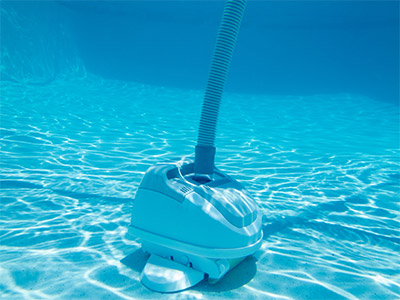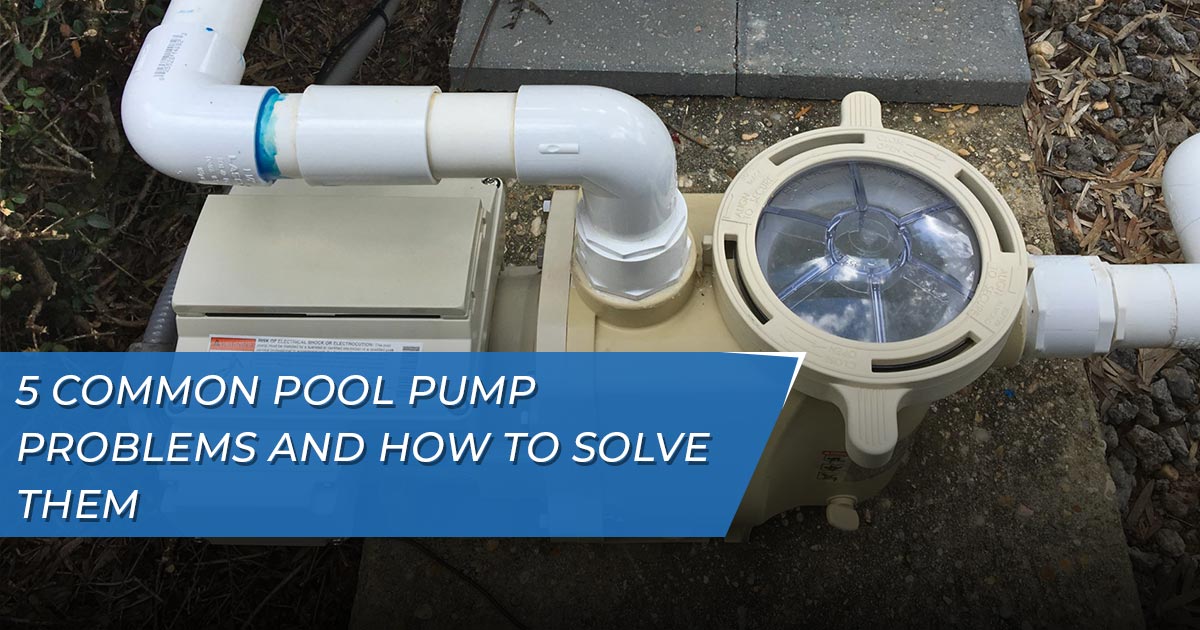5 Common Pool Pump Problems and How To Solve Them
Even the most cutting-edge, heavy-duty pool pumps experience functional difficulties from time to time. As a Florida resident, common pool pump problems can be an inconvenience when issues appear at random. The truth is, that pool pumps see a lot of annual wear and tear, and a single storm, temperature shift, or electrical outage can create equipment issues.
So it’s important to identify any pool pump issues before they progress. In most cases, you can catch pool pump problems as soon as they happen. To keep your pool pump operating at peak efficiency, look out for five of the most common pool pump problems and how to fix them:
1. Pool pump is making loud noises
It could be tempting to ignore your pool pump motor when it starts making strange sounds. However, those noises can be an indicator that something is wrong. While pool pump noises do vary in volume, you’ll want to examine any noises that may come across as too loud or uncommon for your system. Troubleshooting your pool pump can help prevent further issues before they have the chance to begin.
What causes a noisy pool pump?
A noisy pool pump can occur due to several factors. A blocked impeller or lines are some of the most common reasons for a noisy pool pump. Unsecure mounting and low water levels can also contribute to a noisy pump.
Troubleshooting a noisy pool pump
Pool pump troubleshooting for loud noises usually involves a quick review of the pump to ensure that everything is functioning as it should. Take a moment to review the bearings, ensure the pump is mounted properly, check for impeller blockages, look for leaks, and be sure that all your seals are intact.
2. Pool pump is leaking
Leaks are also common issues that cause pool pumps to stop working. Pool pump leaks can also be the cause of loud churning noises throughout the day.
What causes pool pump leaks?
An air leak occurs when a pump’s O-rings wear out. Worn O-rings can’t create a proper seal to contain the water in your pump. Since the water is no longer being sufficiently contained, it leaks out and adds additional strain to your setup.
Troubleshooting a leaky pool pump
When attempting to troubleshoot, listen for hissing air on any pipes leading toward your pool pump. If you find any, spray the area with a hose and look for sputtering water. This is an easy way to assess whether or not you have an active air leak and where it is in the hose. If your pump area is taking on extra water, try re-priming the pump and observing the water levels.
3. Pool pump motor going bad
Sometimes, the worst pool pump problems are the most common. Pool pump motors are the main components that keep your pool’s heating and sanitation systems running. The motor does a lot of work to keep your pool in pristine condition. Over time, simple wear and tear can cause them to break down to the point of dysfunction.
How to tell if your pool pump motor is going bad
It’s not always easy to spot a pool pump that has come to a point of significant deterioration, but it is possible. For instance, a metal-on-metal sound is a clear indicator that there may be an issue with the motor. This noise can mean your pump’s internal components are either stuck together and creating a lot of internal friction, or they’ve become loose inside.
Troubleshooting your pool pump motor
To troubleshoot your pool pump motor, take a quick assessment. Can you hear any rattling noises? Does it sound like plastic is striking metal? If you do hear any clanging, screeching, or banging, do yourself a favor and reach out to the pool professionals. Unfortunately, these parts can be complex and require highly technical adjustments, if not a complete replacement.
4. Pool pump not turning on
Have you come out to check on your pool only to find that the pool pump is struggling to turn on? A slow, semi-responsive pool motor is never a good thing.
Reasons for your pool pump not working
When your pool pump won’t turn on, the first place to look is where you’d look for most electrical issues: your breaker, the wiring system, and the capacitor.
Additionally, there may be a faulty configuration or even a clog somewhere in the system.
Troubleshooting when your pool pump won’t turn on 
Begin the troubleshooting process by checking the breaker, the pump timer, and any jams or clogs in the pump.
If your pump motor struggles to turn on entirely with no hum or whirl to be found, contact a professional.
5. Pool vacuum has no suction
Even though your pool’s vacuum cleaner might be considered separate from your pool system’s other components, the truth is that it can be directly involved with them. If your vacuum is slow to pick up debris, it stops moving, or it’s failing to collect dirt, take a closer look to ensure it’s not affecting the pool pump.
Faulty vacuum
Sometimes vacuum issues are as simple as a dirty filter preventing the proper suction to clean debris. Hopefully, this is the case, otherwise, you may have a bigger issue on your hands.
Troubleshooting a faulty pool vacuum
While your pool pump is on, make sure the vacuum cleaner line is open by checking the valve line. Clean the filter if it’s dirty. If none of these routine maintenance options work, you might have an air leak.
Avoid pool pump issues with GPS Pools
At GPS Pools, we take pride in keeping our community happy. Give us a call or visit us at our Lutz and Land O’ Lakes locations for your pool maintenance needs. Offering only top-quality products from the industry’s best brands, our extensive inventory has everything you need to keep pool pump problems at bay.

